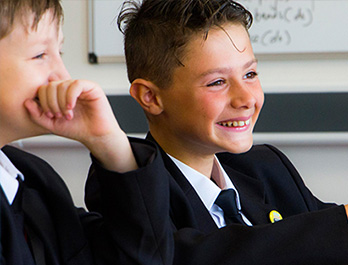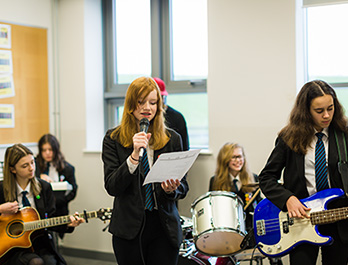
The Background
Co-op Academy Stoke-on-Trent is a mixed Secondary School located in the Tunstall area of Stoke-on-Trent in the beautiful county of Staffordshire. With around 1,000 students, the school relies on 25 feeder schools including St Nathaniel's Academy, St Marys CE, Summerbank and Forest Park. As one of the city’s most successful schools, the Co-op Academy has been recognised both regionally and nationally for its excellent levels of academic success and its pioneering work around personal development.
The school became an academy in 2010 and part of the Co-op Academies Trust, which is sponsored by the Co-operative Group. As part of the government’s Building Schools for the Future (BSF) project, a new building was built on the existing site in 2012.
Like most schools, they remained open from the start of the Covid-19 outbreak – initially for the children of key workers and vulnerable students – and more recently, the returning Year 10 students. Around 15 key worker children were on site at the start, which has grown with around 30 Year 10 students coming back, and more expected each week.
The Academy have partnered with RM for more than eight years, with RM responsible for providing and maintaining their entire ICT infrastructure. This involves maintaining all hardware and regularly updating the software to meet the needs of the staff and students. The Academy benefit from an onsite RM technician who is on hand to support staff and students, solving their IT issues on a day-to-day basis – and he is supported by a team of people – in the UK and offshore – providing round-the-clock cover.
The Challenge
The Co-op Academy have high expectations and as such it is their mission to empower everyone within the school to reach their potential and be the best. In order to achieve this mission, they deliver great learning, support and experience – relying on new and creative technologies to provide students with the means to receive this quality learning.
Against that background, a strategic decision was taken to move to Google Mail in December 2016, with a move to the cloud commencing in September 2017 – supported by RM.
They set up Team Drives and trained all admin and teaching staff on the basic Google Applications, and by December 2018 the majority of resources had migrated to the cloud. During 2019 they introduced Chromebooks and started to trial Google Classroom – initially in the Creative Technologies Faculty – which proved successful – so training commenced for all teaching staff, with staff given the choice to use Classroom or not – with the main deciding factor being whether it would benefit them in their teaching.
“By the start of September 2019 nearly a third of all of our teaching staff were using Google Classroom”
Maria Price, Head of Creative Technologies Faculty

As the Covid-19 pandemic became more and more real, and the possibility of school closures became almost certain by the middle of March 2020, all teaching staff were given morning briefing sessions to go back over how to set up and use Google Classroom. Teachers were asked to create Google Classrooms for every class and so a “virtual school” was set up. This proved to be beneficial as the school closed to the majority of students the following week.
The Response
Not all staff had used Google Meets prior to Covid-19 but with instructions they soon figured it out and the usual face-to-face departmental meetings transferred into Google Hangouts or Meets.
Since then, staff have been delivering all of their lessons online – all fully supported with recap instructions provided on email by their RM technician, who by now was doing exactly the same job – just working from home.
“At first it was strange and I was nervous due to not knowing how long this was going to last for. However, those staff in the Academy who had already been setting and delivering lessons on Google Classroom, found it easier to adapt to remote teaching. Some of our biggest challenges were finding instructions or videos online to support the students in their remote learning as we were no longer physically standing in front of them delivering lessons and therefore not able to support them face to face”
Maria Price, Head of Creative Technologies Faculty
Some of the challenges have been this lack of face to face contact, which has been addressed by providing support to students via Google Classroom and/or email. Marking online work and responding to individual messages and emails has also proven to be more time consuming than talking and explaining to a whole class at the same time.
For some staff who did not previously use Google Classroom it was a big adjustment learning how to use the different features within the software, but as the weeks have passed, staff have become confident and are now showing each other the new features and tools they are discovering.
Roles have also expanded – in the case of the Co-op Academy, the person who previously supported students with their queries and had trained staff on Google Applications and Google Classroom, has become the school’s “go to” person for all colleagues and their Google issues.
“Student engagement has been incredible considering the circumstances. 71 % of the students in the Academy have been completing lessons via our “virtual school”. And staff have been amazing working incredibly hard planning and delivering lessons via Google Classroom”
Maria Price, Head of Creative Technologies Faculty
With the RM technician seen as an extension of the team at the Co-op Academy, it is no surprise that they needed to get stuck in as well.
“RM have helped by ensuring all methods of online communication and teaching and learning have functioned properly at all times. One example being where the email did stop working one weekend and the RM team jumped to it – even working on the Sunday – to resolve the issue so that remote learning and our virtual school could continue as usual on the Monday morning. Put simply, it enabled staff to do their jobs and students to continue with their learning”
Maria Price, Head of Creative Technologies Faculty
Whilst not all schools are the same, for teachers at the Co-op Academy, the past three months of lockdown have shown how important technology is, and its role within an education setting.
“As an organisation where continuous learning is at its heart, the lockdown has provided our Academy with the impetus to empower both staff and students to increase their ICT and technical skills – with many learning new online applications and features within Google Classroom”
Maria Price, Head of Creative Technologies Faculty

The Lessons Learnt
- Embrace the cloud – any school that has not yet moved to the cloud, Google and Google Classroom is a way forward that has made all the difference for the likes of the Co-op Academy Stoke-on-Trent.
- Empower your people – whilst the Co-op Academy were more enlightened than some, by giving staff – and pupils – the freedom to experiment with technology, this has enabled them to learn faster and develop new skills, that will be with them forever.
- Work together – this was a new experience for everyone, but deciding to work with a larger business, like RM, gave Co-op Academy the security to know that if anyone could support them, RM could.
The Legacy
When staff and all students are permitted to return to the Academy, the ICT skills of just about everyone will have increased significantly. This is something the Academy expects to build upon, with both staff and students expanding their use of Google Classroom to enhance the teaching and learning for all.
“The past fourteen weeks has made people realise the fundamental role that technology can play in empowering, engaging, supporting, collaborating and enhancing teaching and learning right across the Academy”
Maria Price, Head of Creative Technologies Faculty
Download a PDF of the case study